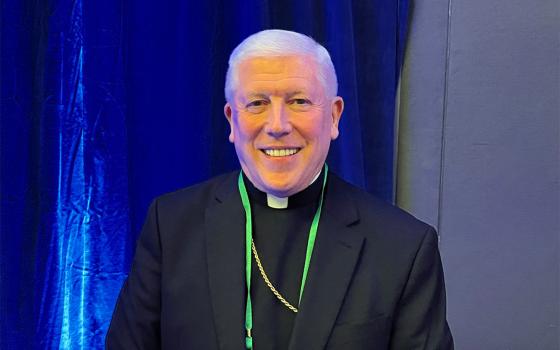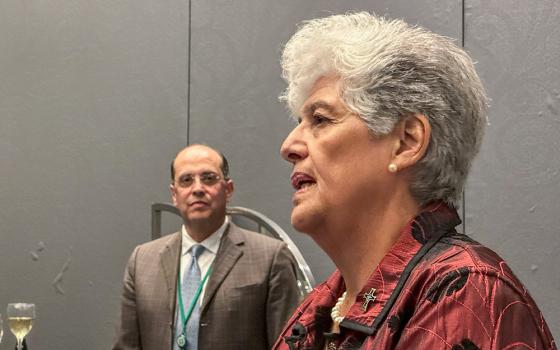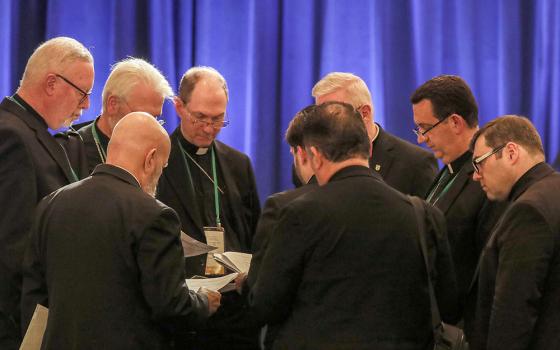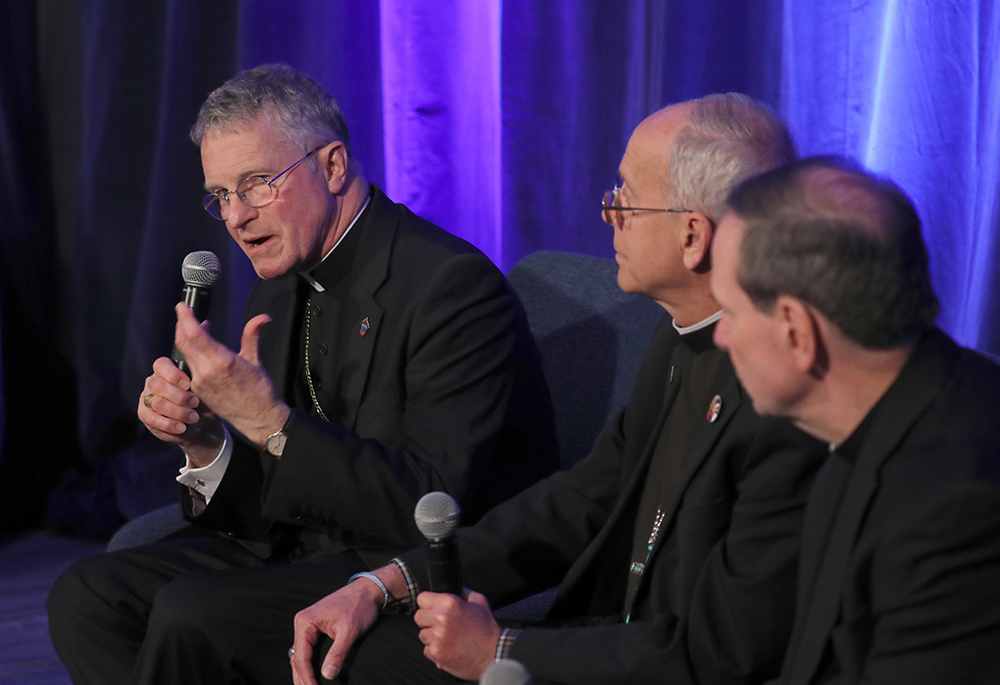
Archbishop Timothy Broglio of the U.S. Archdiocese for the Military Services, president of the U.S. Conference of Catholic Bishops, speaks during a news conference at a Nov. 12 session of the conference's fall general assembly in Baltimore. Also pictured are Bishops Mark Seitz of El Paso, Texas, and Michael Burbidge of Arlington, Virginia. (OSV News/Bob Roller)
The Catholic Church will continue to stand by migrants who cross the border without legal documents despite President-elect Donald Trump’s plans for mass deportations of immigrants, the president of the U.S. Conference of Catholic Bishops said Nov. 12.
While stipulating that the U.S. bishops "certainly do not encourage illegal immigration," Archbishop Timothy Broglio of the U.S. Archdiocese for the Military Services said church leaders will remain mindful of the Gospel imperative to care for "the hungry, thirsty, naked, homeless, stranger, or sick."
"We must insist on the dignity of human person from womb to tomb, to defend and lift up the poor, to combat the evil of racism, and to encourage immigration reform while we continue to care for those in need who cross our borders," Broglio said during his presidential address at the U.S. bishops' fall plenary assembly in Baltimore.
Later speaking with reporters, Broglio said that the Catholic Church in the United States will "certainly take care of those who come to this country and represent the face of Christ in their need."
Broglio's remarks come amid heightened concerns in immigrant communities since the Nov. 5 election of Trump, the former president whose campaign promised to launch a mass deportation program of undocumented immigrants upon his return to the White House.
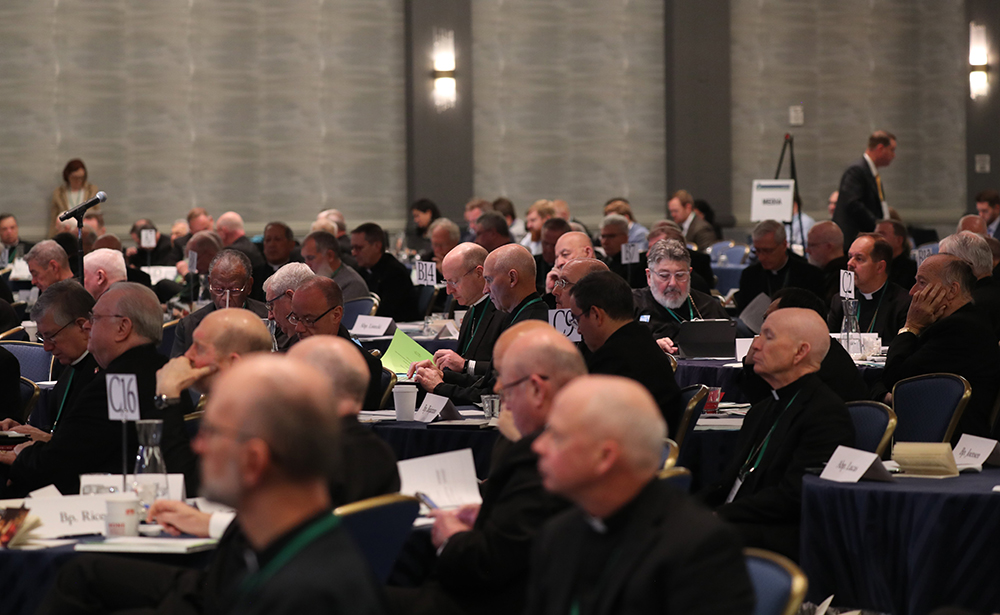
Bishops attend a Nov. 12 session of the fall general assembly of the U.S. Conference of Catholic Bishops in Baltimore. (OSV News/Bob Roller)
There are an estimated 11 million immigrants living in the United States without legal documents.
Bishop Mark Seitz of El Paso, Texas, who recently served a term as chairman of the migration committee of the bishops' conference, told reporters on Nov. 12 that church leaders are "waiting to see exactly what takes shape" in regards to the incoming Trump administration’s immigration enforcement strategy.
"If there is some kind of [immigration enforcement] process, we're going to be very concerned and express that concern that that process unfold in a legal way, that people's civil rights, their basic human rights … are respected," said Seitz, who added that the bishops will speak out if "those basic protections" for migrants are not respected.
"This is going to be a test for our nation," Seitz said. "Are we in fact a nation based on law, on the most fundamental laws about the rights of a human person, or are we not?"
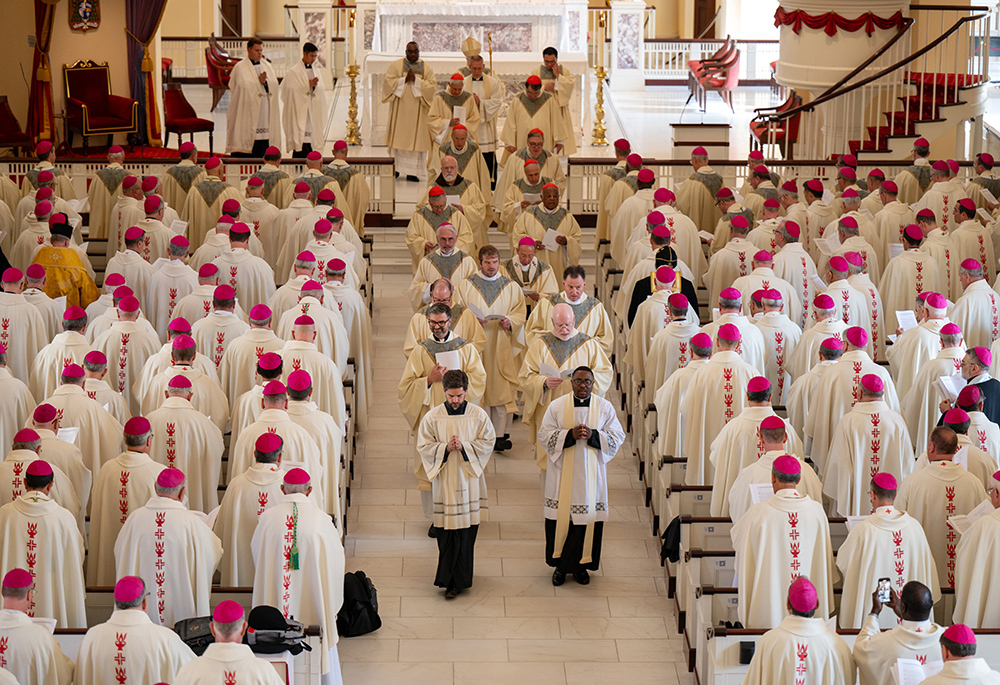
Bishops from around the country gather at the Basilica of the National Shrine of the Assumption of the Blessed Virgin Mary Nov. 11 in Baltimore, for the opening Mass of the U.S. Conference of Catholic Bishops' 2024 fall plenary assembly. (OSV News/Catholic Review/Kevin J. Parks)
According to the Center for Migration Studies, a Scalabrinian think tank, mass deportation threatens to break up nearly 5 million American families and would damage long-standing communities across the country. Broglio added that a mass deportation program would also not be "very economically sound" given the labor demand that migrants meet in many job sectors.
Regarding Trump's promises to use the military for immigration enforcement, Broglio said that while military service members are required to follow lawful orders, they also cannot be forced to act against their conscience.
"Fundamentally this country has always defended religious freedom, not the freedom to worship, but religious freedom," Broglio said. "So I think we have to insist on our ability to live according to our faith and also to practice that faith, especially as it applies to the most needy and really the most marginalized of our society."
At the start of the public session of the bishops' plenary assembly Nov. 11-14 in Baltimore, they also heard from Cardinal Christophe Pierre, the Vatican's ambassador to the United States who commented on the recent presidential election.
"We have been living through an intense election cycle, which has challenged us to give witness to the Gospel of peace in the midst of a political climate that seems like a kind of war," Pierre said.
In their letter to Pope Francis, the U.S. Catholic bishops asked the pontiff to pray "for the people of the United States during this time of transition." Read by Fr. Michael Fuller, the general secretary of the bishops' conference, the letter said: "We pray that the transition of power may be peaceful and the incoming administration may promote life and dignity of all people."
Advertisement
In other matters, Archbishop Bernard Hebda of St. Paul and Minneapolis, Minnesota, was elected treasurer of the bishops' conference. Five other bishops were elected as chairmen of standing committees:
- Bishop Ronald Hicks of Joliet, Illinois, as chairman of the Committee on Clergy, Consecrated Life, and Vocations;
- Bishop Michael Woost, an auxiliary bishop in Cleveland, Ohio, as chairman of the Committee on Divine Worship;
- Archbishop Shelton Fabre of Louisville, Kentucky, as chairman of the Committee on Domestic Justice and Human Development;
- Bishop Edward J. Burns of Dallas, Texas, as chairman of the Committee on Laity, Marriage, Family Life and Youth;
- Bishop Brendan Cahill of Victoria, Texas, as chairman of the Committee on Migration.
In their afternoon session Nov. 12, the bishops received an update on the synod on synodality, the three-year consultative process that ended Oct. 26 in Rome. The synod's final report called on all baptized Catholics to shape the future of the church, as well as for increased transparency and accountability.
"The Lord Jesus listened without being threatened by what he heard," Brownsville, Texas, Bishop Daniel Flores, said in his presentation on synodality, adding that everyone in the church "can strive for the same" kind of active listening.
Cardinal Robert McElroy, the bishop of San Diego, proposed that the bishops' conference set up a task force to implement synodal processes in the conference, an idea that a majority of bishops via voice vote said they supported.
The bishops also received a presentation on the 10th National Eucharistic Congress, held July 17-21 in Indianapolis. An estimated 50,000 people participated in the five-day gathering that featured liturgies, adoration of the Blessed Sacrament, musical and dramatic performances, panel discussions, a procession, and individual presentations on various topics related to the Eucharist.
"So many people commented on the palpable joy of the whole event, which may be described as a taste of heaven," said Bishop Andrew Cozzens of Crookston, Minnesota, who has served as the bishops' point man for the eucharistic revival and congress.
Washington Auxiliary Bishop Roy Campbell Jr. who is also president of the National Black Catholic Congress, presented a video on the history of the congress and its mission in the church. Ukrainian Catholic Bishop Stepan Sus, of the major archiepiscopal curia, discussed the church's plight in wartorn Ukraine and thanked the U.S. bishops for their support. He received a standing ovation following his presentation.
This story has been updated throughout to include additional reporting on the bishops' letter to Pope Francis and the afternoon session of Nov. 12.




